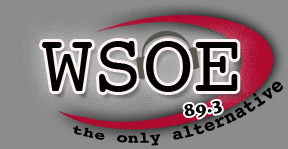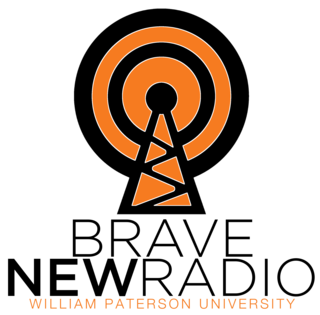Related Research Articles

BBC Radio 1 is a British national radio station owned and operated by the BBC. It specialises in modern popular music and current chart hits throughout the day. Radio 1 provides alternative genres at night, including electronica, dance, hip hop and indie, whilst its sister station 1Xtra plays Black contemporary music, including hip hop and R&B.
Music radio is a radio format in which music is the main broadcast content. After television replaced old time radio's dramatic content, music formats became dominant in many countries. Radio drama and comedy continue, often on public radio.

WRSU is a non-commercial college radio station serving the greater Central New Jersey area, broadcasting from the campus of Rutgers University in New Brunswick, New Jersey. It is a student and faculty-run radio station with Rutgers faculty member Mike Pavlichko serving as its Broadcast Administrator. WRSU broadcasts on FM and streams all of its programming online.
WHRB is a commercial FM radio station in Cambridge, Massachusetts. It broadcasts at 95.3 MHz and is operated by students at Harvard College. The station is owned by Harvard Radio Broadcasting Co., Inc., a non-profit corporation independent of Harvard University.
WNUR-FM is a 7,200–watt radio station based in Evanston, Illinois that broadcasts to Chicago and its northern suburbs. It is the student radio station of Northwestern University.
Annie Avril Nightingale is an English radio and television broadcaster. She was the first female presenter on BBC Radio 1 in 1970, and is its longest-serving presenter.

WTBU (640 kHz/89.3 MHz) is a "Part 15" student-managed and -operated radio station at Boston University. This means it is not licensed by the FCC but operates legally under special "low power" rules. It has a block-format programming schedule, with individual DJs able to play pretty much whatever they choose during their weekly airshifts. Overall the sound skews mostly rock/alternative, but can vary significantly, including pop, urban, rap, classic rock, Triple-A, trance, electro, industrial and metal or just true freeform.
WVKR-FM(Independent Radio) is a college radio station owned by, and primarily staffed by students of, Vassar College in Poughkeepsie, New York. The station broadcasts on 91.3 MHz at 3,700 watts ERP from a tower in Milton, New York with a directional signal to the south. The station also streams on the web.

WZBC is a radio station broadcasting an Alternative format. Licensed to Newton, Massachusetts, United States, the station serves Boston and its western suburbs. The station is currently owned by Boston College.

WWBX is a radio station with a hot adult contemporary format in Boston, Massachusetts. The format started at 98.5 FM on February 9, 1991, and moved to 104.1 FM, replacing WBCN on August 12, 2009, to allow for the launch of WBZ-FM at 98.5 the next day. Its studios are located in Brighton, and its transmitter is on the upper FM mast of the Prudential Tower.

WMFO is a freeform radio station licensed to Medford, Massachusetts. The station is owned by Tufts University and is run by students and community members. WMFO is funded by the Tufts Student Activities Fee as allocated by the TCU Senate and through community donations.
WUOG is a student-run college radio station licensed in Athens, Georgia. The station serves the Athens area and is currently owned by the University of Georgia.

WSOE is a non-commercial student-run college radio station based at Elon University in Elon, North Carolina that broadcasts at 89.3fm. The station serves as a creative outlet for students and as a means for students to develop skills for professional broadcast careers. WSOE offers a variety of opportunities in music shows, sports broadcasting, artist interviews, and music technology. The station aims to promote local artists through ticket giveaways, interviews, and playing these musicians' music over the air.

WMTU-FM 91.9 is a campus radio station run by the students at Michigan Technological University. It is found in the basement of Wadsworth Hall. It works 24 hours a day, 7 days a week. Staff is constituted of a volunteer general staff featuring a general manager and six different departments as well as the air staff. Open DJ signups are held the first Wednesday and Thursday of each semester, including the summer tracks.

WPSC-FM – branded as Brave New Radio – is William Paterson University's non-commercial radio station, broadcasting an alternative hip hop format. Licensed to Wayne, New Jersey, the station serves the northern New Jersey and western New York City area. In 2012, 2013, 2017 and, most recently, March 2018, the station was named Best College Radio Station by the Intercollegiate Broadcast System. Brave New Radio serves as the founding headquarters for World College Radio Day, an annual event created by the station's former General Manager. In 2011, WPSC was one of the top 25 stations nominated for the mtvU Woodie Award for Best College Radio Station.
WUAG is a radio station broadcasting a variety format. Licensed to Greensboro, North Carolina, United States, the station serves the Piedmont Triad area. The station is currently owned by the University of North Carolina at Greensboro.
Patrick Amory is a historian and an executive in the recorded music industry.
WTJU is a Variety formatted broadcast radio station licensed to Charlottesville, Virginia, serving Charlottesville and Albemarle County, Virginia. WTJU is owned and operated by University of Virginia.
Sounds of the 70s is the name of BBC radio programme, currently broadcast on Sundays by BBC Radio 2, with the Sounds of the Seventies name also having been used by BBC Television for a number of themed music compilations, now repeated on BBC Four.
WKPX 88.5 FM is the non-commercial, educational radio station owned and operated by the Broward County Public Schools (BCPS), broadcasting at 3000 watts and reaching all of Broward County. In mid-2020, production studios were relocated from Piper High School, where the station had operated for many years, to BECON's production facility in Davie. This move is a first step in a plan to create internship opportunities for students throughout BCPS to get training and practical experience in radio as well as television and video production.
References
- ↑ Record Hospital, .record hospital., archived from the original on 2008-10-06, retrieved 2008-10-05
- ↑ Schwartz, Madeleine. "33.3 RPM". Harvard Magazine. Retrieved 2 October 2015.
- ↑ "Listen to Harvard radio station on your iPhone" (Cambridge Chronicle, March 27, 2009) Accessed 2012-04-13
- ↑ Boston Phoenix article, Ancient Pre-Internet Message Boards Unearthed at Harvard , retrieved 2008-10-05
- ↑ "WHRB Orgies®". WHRB. Harvard Radio. Retrieved 2 October 2015.